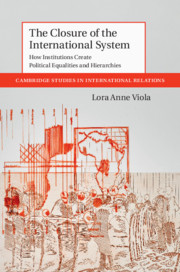 The Closure of the International System
The Closure of the International System Diplomacy, Practices of Closure, and the Emergence of an International System in Early Modern Europe
Published online by Cambridge University Press: 16 June 2020
This chapter argues that the emergence of what we recognize as the modern international system develops through evolving practices of diplomacy. IR literature has increasingly paid attention to the early modern development of diplomacy to understand the origins of the system. This chapter offers a distinct interpretation of the importance of diplomacy from the perspective of the closure thesis. In contrast to the typical account of diplomacy as mediating the political fractures that resulted from the breakdown of Christendom, it argues that the adoption and diffusion of specific diplomatic practices, such as the permanent resident ambassador, facilitated closure and boundary-drawing by narrowing the types of actors invested with rights of political representation. Diplomatic practices emerged in part as a means of producing common goods and securing privileged access to those goods for some political actors, while facilitating the political exclusion and subordination of others. The chapter concludes with a discussion of the argument’s contemporary relevance. In reflecting on an historical age in which the sovereign state was not yet the only legitimate political agent, the contemporary question is whether today’s legal and representational rights at the global level can or should be emancipated from the state.
To save this book to your Kindle, first ensure [email protected] is added to your Approved Personal Document E-mail List under your Personal Document Settings on the Manage Your Content and Devices page of your Amazon account. Then enter the ‘name’ part of your Kindle email address below. Find out more about saving to your Kindle.
Note you can select to save to either the @free.kindle.com or @kindle.com variations. ‘@free.kindle.com’ emails are free but can only be saved to your device when it is connected to wi-fi. ‘@kindle.com’ emails can be delivered even when you are not connected to wi-fi, but note that service fees apply.
Find out more about the Kindle Personal Document Service.
To save content items to your account, please confirm that you agree to abide by our usage policies. If this is the first time you use this feature, you will be asked to authorise Cambridge Core to connect with your account. Find out more about saving content to Dropbox.
To save content items to your account, please confirm that you agree to abide by our usage policies. If this is the first time you use this feature, you will be asked to authorise Cambridge Core to connect with your account. Find out more about saving content to Google Drive.